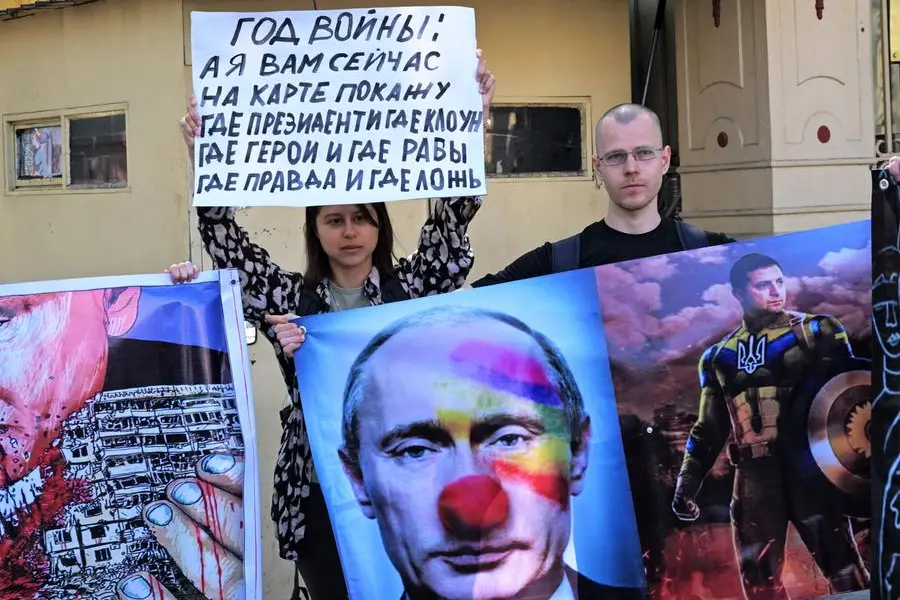PHOTO
President Volodymyr Zelensky vowed Friday to do everything to defeat Russia this year, as the first Leopard tanks arrived in Ukraine on the anniversary of the start of Europe's largest conflict since World War II.
Street protests against the Russian invasion were held in many European capitals to mark the anniversary, and fresh Western sanctions targeted Russia's banks, military industry and semiconductor access.
Meanwhile, the Group of Seven industrialised nations threatened embargo busters with "severe costs".
Poland sent the German-made Leopard tanks to help Ukraine repel Russian troops and deliver a "clear and measurable signal of further support", said Prime Minister Mateusz Morawiecki, who was visiting Kyiv.
Poland would send more tanks soon, Morawiecki added, and was also offering to train Ukrainian pilots to fly F-16 fighter jets, as Western allies underlined their unwavering support.
Russia, however, remained defiant, with former president Dmitry Medvedev insisting his country was ready to push its offensive "to the borders of Poland".
Tensions were also building on Ukraine's border with Moldova, as Moscow claimed Kyiv was plotting to invade the breakaway region of Transnistria and promised to respond. Moldova denied any threat from Ukraine.
Zelensky said he was planning to meet Chinese President Xi Jinping after the release Friday of Beijing's 12-point position paper on the conflict, which included a call for peace talks and for respecting all territorial sovereignty.
Zelensky noted that Beijing's paper appeared to show "there is respect for our territorial integrity, security issues".
Earlier Friday, he said in a statement that Ukraine would "do everything to gain victory this year".
- 'Spirit is strong' -
A year ago Friday, Russian President Vladimir Putin stunned the world by sending tanks and troops across the border, a move seen as punishment for Kyiv's pivot to the West.
The war has devastated swathes of Ukraine, displaced millions, turned Russia into a pariah in the West and, according to Western sources, caused more than 150,000 casualties on each side.
Demonstrators protesting Moscow's aggression marched in cities across Europe to mark the invasion anniversary.
In Berlin, activists placed a Russian tank wreck in front of Moscow's embassy.
Crowds fell silent for a minute from Tallinn to London, while key European buildings were draped or lit up in the blue and yellow colours of Ukraine's flag.
A year ago, Russian troops sought to rapidly install a pro-Moscow regime in Ukraine but failed to conquer Kyiv and subsequently suffered defeats in northeastern and southern Ukraine.
Since October, Russia has pummelled Ukraine's energy infrastructure, causing power shortages for millions during winter.
Despite the daily trials, many Ukrainians refuse to be cowed.
In Bucha, where Russia has been accused of widespread atrocities, 64-year-old Galyna Gamulets recalled coming under fire from Russian troops for more than two weeks.
She voiced pride in her nation and said "we will succeed" in repelling the invaders.
- 'Living hell' -
The West, which has imposed increasingly stringent sanctions on Russia and boosted humanitarian aid and arms supplies for Ukraine, unveiled more help Friday.
The United States announced sweeping sanctions aimed not just at Russia but also 200 individuals and entities across Europe, Asia and the Middle East supporting Moscow's war.
After a video call, G7 allies warned: "third-countries or other international actors who seek to evade or undermine our measures" must "cease providing material support to Russia's war, or face severe costs".
Washington's new aid package came days after President Joe Biden arrived in Kyiv for a historic visit and pledged new arms deliveries.
However, Biden on Friday ruled out providing the F-16 fighter jets Ukraine has requested, at least for the time being, telling ABC News in an interview that Zelensky "doesn't need F-16s now".
"Look, we're sending him what our seasoned military thinks he needs now. He needs tanks, he needs artillery, he needs air defence, including Himars," Biden said.
"There are things we're sending him to put him in a position to make gains this spring and summer going into the fall."
The EU also agreed to a fresh round of sanctions, and along with contributions from Sweden and Portugal, Germany said it had managed to assemble a battalion of modern Leopard 2 tanks for Ukraine.
The World Bank separately announced an extra $2.5 billion for Ukraine to support essential services and core government functions.
On Friday, after a minute's silence at the Security Council, UN Secretary-General Antonio Guterres denounced Russia's military action, saying it had made life for Ukrainians a "living hell".
- China's key role -
Key player China has sought to position itself as a neutral party while maintaining close ties with Russia.
Responding to Beijing's new position paper, Moscow said it "highly values" China's contribution but insisted any conflict settlement must recognise Russia's control over four Ukrainian regions it annexed.
Western countries gave China's plan a muted reception. German President Frank-Walter Steinmeier said it was "still doubtful" Beijing sincerely wanted to play a constructive role in seeking peace.
NATO chief Jens Stoltenberg said Beijing simply "doesn't have much credibility because they have not been able to condemn the illegal invasion of Ukraine".
-'Miracles happen'-
On eastern Ukraine's frontline, morale remained high among Kyiv's troops.
"God is helping us. Nobody thought that Ukraine would hold," said a soldier who goes by the call sign "Cook" in the eastern region of Donetsk. "I know that miracles happen."
Despite military setbacks and sanctions, Putin, 70, has refused to back down, accusing the West of supporting neo-Nazi forces and claiming Russia's survival was at stake.
His assault on Ukraine and mobilisation of reservists have sparked what might be Russia's largest mass exodus since 1917's Bolshevik Revolution.
But with television propaganda in overdrive, many Russians have rallied behind Putin despite economic trouble and multiplying casualties.
"The country is really changing for the better," said Lyubov Yudina, a 48-year-old security guard in Moscow.
But teacher Ruslan Melnikov, 28, was dejected. "I don't see any future now."





















